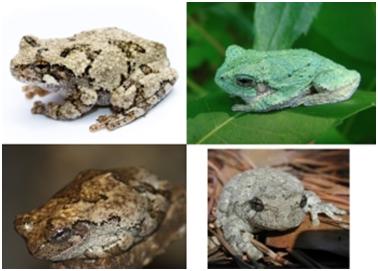The definition of a kind is: All the organisms that are descended from a universal ancestor population.
Stripe, 6days Are all frogs one "kind" or not?
We don't know for sure.
See how that works? (Or rather, doesn't work?)
The definition of a kind is: All the organisms that are descended from a universal ancestor population.
Stripe, 6days Are all frogs one "kind" or not?
We don't know for sure.
See how that works?
Testable definition...
See how that works? (Or rather, doesn't work?)
Ya, its kind of like this -
If evolution is the process by which different kinds of living organisms are thought to have developed and diversified from earlier forms during the history of the earth, where did the earliest forms come from?
answer: We're not sure.
See how that works? (Or rather, doesn't work?)
Stripe's definition of "kind" cannot tell us if there is one frog kind or 100 frog kinds.
Stripe's definition of "kind" cannot tell us if there is one frog kind or 100 frog kinds.
The definition of a circle — the set of points equidistant from a common center — cannot tell us how big a planet has to be before it will be rounded by its own gravity.
A definition is a definition
A biblical 'kind' was an, originally created, variety of plant or animal which could, prior to the fall, produce viable offspring of the same variety but not with other varieties.
The result of genetic degeneration over many generations after the fall, mainly from mutations, is that the original 'kinds' have deteriorated and broken into groups we now call species.
You couldn't find a more biased opinion than that of NCSE who is against academic freedom, promoting 'darwinisn only'.User Name said:This confirms the statement by NCSE that I posted earlier:
User Name said:But at least the mainstream scientific definition of "species" is much more workable: "A species is often defined as the largest group of organisms capable of interbreeding and producing fertile offspring." From this definition, we can observe that there are approximately 4,810 species of frogs known to exist. However, the creationists cannot say how many "kinds" of frogs there are, because...?
Not true... From God's Word we know humans are not the same created kind as chimps. No creationist would say chimps and humans are the same kind.From creationists who actually have some science background, I've been told that this corresponds roughly to the level of families, meaning that a single order could be expected to produce new families, genera, and species. However, it has been very difficult to draw those lines. And the real kicker is that such a definition would put humans and chimpanzees in the same "baramin." (a new word for "kind")
Interesting how evolutionism always involves flexible definitions and explanations. Different definitions have been attempted by Darwin, Dobzhansky, Templeton, Mayr, and even some creationist scientists such as ReMine.... all definitions slightly different.
Also interesting is how evolutionists bend the definitions for inconvenient truths such as with Neandertals.
The Biblical model would predict rapid formation of new varieties....
Funny.....and a side point, but this is on the news just as typing this. Camel bones with DNA has been found in Northern Canada (Yukon). The interview with the paleontologist says this forces them to "re-draw" the family tree.
Evolutionism is a 'just so' story..... a story is not falsifiable...a story that flexes and bends to accommodate completely contradictory statements.
(Ex. Statement 1 'our eyes have the appearance of good design,,, evidence for evolution'.
Interesting how evolutionism always involves flexible definitions and explanations. Different definitions have been attempted by Darwin, Dobzhansky, Templeton, Mayr, and even some creationist scientists such as ReMine.... all definitions slightly different.
The definition of a circle — the set of points equidistant from a common center — cannot tell us how big a planet has to be before it will be rounded by its own gravity.
A definition is a definition; evolutionists like to pretend it is a classification system when they face this challenge.
You're not the first to make this mistake.

Ya, its kind of like this -
If evolution is the process by which different kinds of living organisms are thought to have developed and diversified from earlier forms during the history of the earth, where did the earliest forms come from?
answer: We're not sure.
See how that works? (Or rather, doesn't work?)
No... not really. If you want to discuss where life originated, the most logical and scientific explanation, and scriptural answer is that life comes from life. And, that the original Life / Creator must be uncaused.Where the earliest life forms came from isn't part of the definition.
You can just as easily be asked where Creator came from in the kind "definition".
Ya, its kind of like this -
If evolution is the process by which different kinds of living organisms are thought to have developed and diversified from earlier forms during the history of the earth, where did the earliest forms come from?
answer: We're not sure.
See how that works?
No... not really. If you want to discuss where life originated, the most logical and scientific explanation, and scriptural answer is that life comes from life.
False.... The word 'species' does not have a precise definition.... Both terms (kinds and species) are somewhat based on beliefs about our origins.The creationist definition for "kind" is even more flexible. And why is this? Because, as NCSE states, "every imaginable gradation between species exists." The difference between the two terms is that "species" can be used to interpret and investigate nature, whereas "kinds" cannot.
See this article on "baraminology," for example: http://evolutionwiki.org/wiki/Baramin
